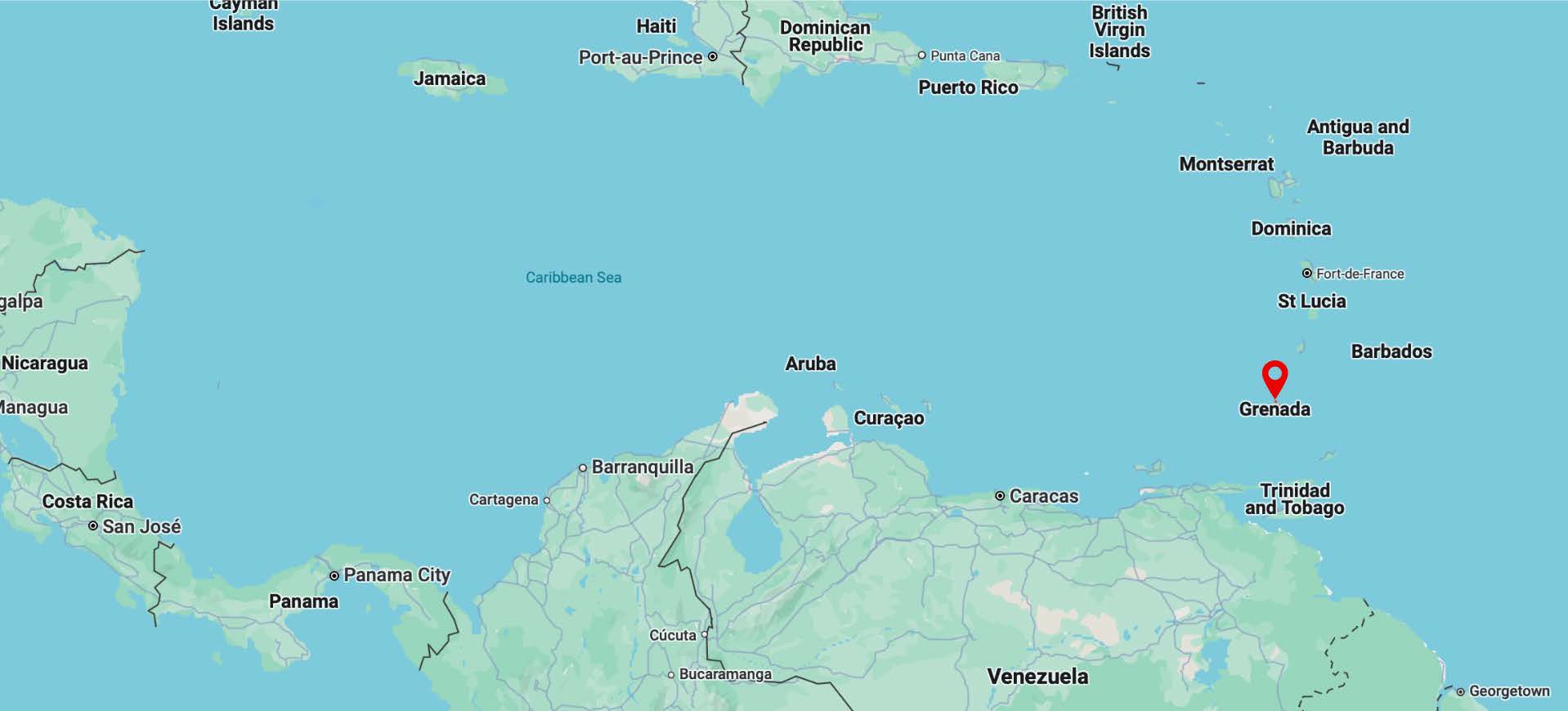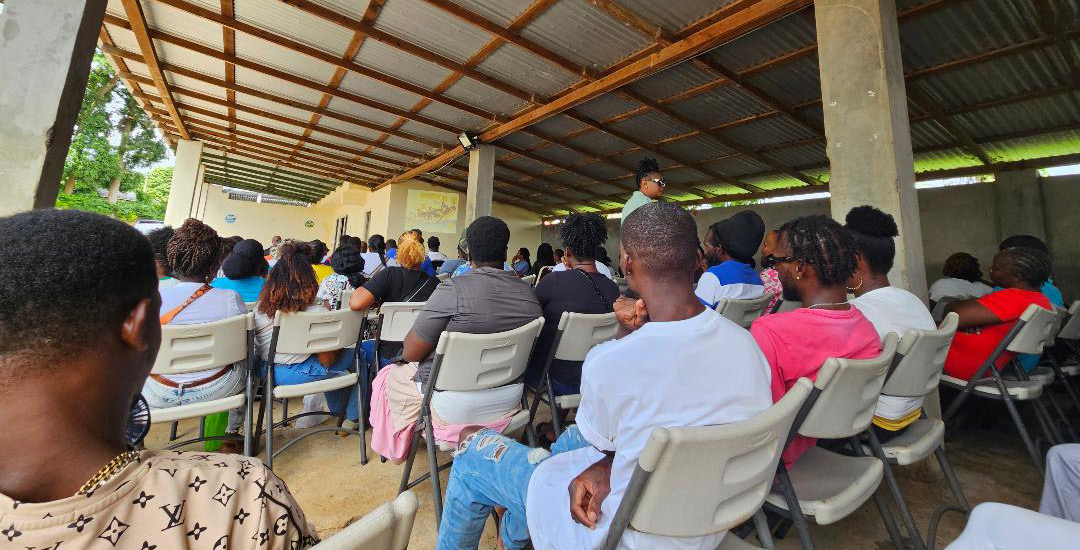Case Study: Improving Public Service Productivity and Well-Being in Grenada

Often referred to as the vibrant “Spice Island,” Grenada is a small group of three islands located at the southern tip of the Caribbean hurricane zone. This picturesque destination is home to approximately 120,000 residents who celebrated the country’s 51st anniversary of independence in February 2025.
Economic development hasn’t been easy for the small island state, which has struggled with a lack of economic diversification, vulnerability to external shocks, and difficulty achieving economies of scale in developing both physical infrastructure and workforce skills. According to the World Bank, Grenada’s economic growth has averaged just over three percent per year since independence. However, the IMF reports that Grenada’s economy has experienced sustained, robust growth in recent years, supported by buoyant tourism and a surge in Citizenship-By-Investment (CBI) revenues.
In 2013, Grenada faced a severe cash crunch, with a substantial portion of government spending consumed by debt servicing and the public sector wage bill. As a result, the country undertook a structural adjustment program that implemented strict attrition measures, resulting in the retention of 30% of the workers exiting the public service annually.
To support the continued delivery of services whilst getting around the wage bill cap and freeze in recruiting permanent staff, civil service managers used at least six different modes of hiring, most of which were some forms of contract without benefits. As a result, Grenada ended up with a parallel public service where workers faced significant disparities. The non-traditional parallel public sector employees faced challenges such as insecurity of tenure, inequality of pay and vacation inequity, professional immobility, and inability to access funds for personal development.
This produced a fertile environment for worker discontent and low morale, from which some employees retired after a lifetime of service with zero pension benefits.

Enhancing Public Sector Efficiency by Tackling Issues of Inequity
Grenada’s current government, led by Prime Minister Dickon Mitchell, came to power in 2022 with several policy priorities, including improving the ease of doing business, removing barriers to growth, and improving the efficiency of public services. Key to the latter priority was the regularization of public service work arrangements.
The country’s public sector reform is taking place through three integrated initiatives aimed at improving both worker welfare and overall productivity: regularization, pension reform, and the integration of performance management approaches. Led by Grenada’s Department of Public Administration, the government’s analysis was that “an appropriately phased regularization of the public sector workforce, guided by an ongoing review of job functions, would help improve the efficient delivery of public services alongside the broader public service reforms,” said the Department’s Permanent Secretary (PS), Lyndonna Hillaire-Marshall.
The regularization exercise was urgently needed as Grenada had both a core public service of over 3,300 regular employees and a parallel public service of approximately 3,600 workers employed under alternative contracts with inferior terms, conditions and benefits.
The most glaring discrepancy between the working conditions of the core public service and the parallel public service was that the former retired with a defined benefit pension plan while the latter had virtually no pension benefits. As a result, a carefully coordinated reform of the public sector pension scheme is now underway as a high priority. Given the need to contain the fiscal burden on public finances, the government plans to offer these newly regularized employees a defined contribution pension plan.
Permanent Secretary Hillaire-Marshall likened the initial situation of Grenada’s public service to that of a small boat struggling on the Caribbean Sea in the illustration below. “What would happen to that boat if Grenada’s policy makers didn’t intervene and make reforms to the way the system operates?” she asks. Essentially, some government employees feel secure whilst others are feeling desperate. Eventually, if the situation isn’t fixed, all employees would be affected when the boat sinks.
Grenada’s government needed to address the anomalies between the working conditions of the established core workers and the others who felt exploited. “We really were between a rock and a hard place,” said PS Hillaire-Marshall. “If you have a morale issue, it’s difficult to get adequate job performance. So, we needed to soften the negative morale, but at the same time, we didn’t want to get back to having a swollen public service,” she added.
This is not a modest set of goals. The government wants to have a public service where employees benefit from security of tenure, adequate compensation, hiring based on merit, high morale and productivity levels, and pensions that enable all eligible workers to retire with some level of comfort.
Although Grenada had received advice from international experts on public sector reform during the decade after the structural adjustment, it was still working through the initial IMF policy prescriptions updated via regular IMF monitoring visits.
In 2023, the Department of Public Administration decided it needed a human resources management consultant to work alongside them and help them implement the regularization and performance management aspects of the reforms. “We had a good sense of where we wanted to go with regularization, performance management and pension reform,” said PS Hillaire-Marshall, “but we felt that any professional support we could get to help shape it would be valuable to us,” she added. So, after learning about the Canada-CARICOM Expert Deployment Mechanism (CCEDM) program from Grenada’s Ministry of Mobilization, Implementation and Transformation (MIT), the Department asked Catalyste+ if it had any advisors on its CCEDM roster who could assist with the regularization and performance management sections of the exercise. CCEDM sent the Department three options, and the Department selected one.

Collaborating with Catalyste+
Ms. Jennifer Crocker, a human resources specialist with over 25 years of Canadian and international experience at the executive level, gained in Indonesia and Mongolia, worked with the Department between September 2023 and January 2025 on three assignments that contributed to Grenada’s public sector reform. Her assignments primarily contributed to advancing the government’s overall reform goals in the areas of functional review, which was key to the regularization process, and on performance management.
Throughout the assignments, she worked closely with the Permanent Secretary and her staff at the Department of Public Administration. Their goal was to kick off the regularization process intended to correct the inherited anomalies in terms of engagement of public sector workers and ensure that, going forward, Grenada’s public service would be fit for purpose, with employees’ jobs aligned to the goals of each Ministry.
Engaging Grenada’s Government Departments and Ministries
Grenada approached the regularization of public officers via a three-phase exercise. The first phase, which ran from 2023 to 2024, looked at people in Acting, Temporary, on Assignment and Probationary status. The second phase looked at people holding PSC contracts, Contracts of Service, Daily Paid, and people holding Ministry letters. This phase advanced throughout 2024 and, after some delays, will be completed in 2025. Following this, the third phase will look at people holding contracts for service and as trainees.
Ms. Crocker’s first assignment began in September 2023 with the launch of a functional review that was intended to answer one key question on the minds of Grenada’s leaders: “How many people did the country need to effectively run its public service?” Essentially, explained Ms. Crocker, the government needed to gather baseline data and information about what its employees were doing, how were they organized, how were they paid, and whether their positions were aligned with the priorities of their ministry.
The Department of Public Administration and Public Sector Reform was committed to a data-driven approach and willing to invest the time and effort needed to unearth the information it needed and convert it into analytical information. With more than 22 ministries and a variety of agencies across the government, one of Ms. Crocker’s first tasks was to help the senior people and working teams the Permanent Secretary had assigned to the functional review to get organized and set out a schedule to gather the data, Ministry by Ministry.
“Key to the success of information gathering was the ability of the PS to attract volunteer retired senior leaders to lead three working groups, each comprised of five or six members, whose function was to gather the data and information,” said Ms. Crocker.

“Data gathered was structured with a questionnaire,” explained Ms. Crocker. “A template to complete and a report format, so assembling information from all the different ministries and departments would be easier. The working teams that followed the presentation format were able to move much further than those who wanted to author an essay on what they found.”
“Teams recruited, trained, and coached on three target Ministries. While I was there, there was an opportunity to adjust the template, if necessary,” said Ms. Crocker.
According to Ms. Crocker, the teams worked together for 18 months and were structured to include multiple perspectives and positions. They were given latitude on team structure, task assignments, and developing solutions to problems met throughout the process. As a result, there was an important level of commitment.
In February 2024, Ms. Crocker returned to Grenada to check in on the progress of the functional review and support the launch of more formal performance management processes in the public sector.
She resumed her coaching for the working teams and assessed the effectiveness of the approach and templates.
She also began working on tasks aimed at improving the performance management system, as there was limited performance data, and limited role clarification, and reporting arrangements were both unclear and top heavy.
A key element introduced on this assignment was the identification of competency measures for leaders and others as well as the development of performance management templates and training materials.
“Ms. Crocker was instrumental in helping us flesh out our competency frameworks and including competencies along with key results areas,” said PS Hillaire-Marshall.
With her help, the department chose five core competencies across the government ministries that could be broken down into three distinct levels, depending on the seniority of the positions.
Unfortunately, Ms. Crocker saw firsthand how being geographically located in a hurricane zone can upend the plans of a small island state. Hurricane Beryl, which occurred in early July 2024, had an impact on the implementation of the performance management plan. This has, in turn, caused some delay in the progress of the regularization process, as the two elements are tightly integrated—the government needs to ensure its hiring appointments are done on a merit basis. However, PS Hillaire-Marshall explained that the reforms are back on track, with the integrated performance management system introduced in January 2025.
Ms. Crocker returned to Grenada for assignment three in December 2024 to January 2025 to collaborate with PS Hillaire-Marshall, studying working group reports and focusing on establishing a clear view of what has been happening in Grenada’s public service.
She helped the Department interpret the empirical data gathered by the working teams, identify any data gaps or inconsistencies, and develop strategies to address issues that had arisen. For example, different government information management systems used in the Ministries reviewed reported conflicting numbers of employees, and some workers were still on the job and receiving salaries even though their contracts had expired.
Other recurring issues requiring resolution included Ministries’ reporting structures, workforce skills and performance cultures.

Overall, on this third visit, Ms. Crocker’s mandate was to leave the Permanent Secretary with recommendations about how to resolve these issues.
Next Steps
“The [Grenada government] now seems to be committed to a performance-oriented culture, driven by the mandate of the new PM, his senior leadership team and the direction of the Permanent Secretary and her teams,” said Ms. Crocker.
Grenada’s public sector reform efforts continue. In its 2024 Article IV Review Mission report, the IMF noted the changes underway and predicted their positive impact on the country’s fiscal outlook:
“Well-coordinated implementation of ongoing public sector reforms will help improve administrative efficiency and the fiscal outlook. The carefully sequenced regularization of public sector workers can help address persistent public administration capacity constraints. Completion of the ongoing public service functional review would help ensure new appointments are well-aligned with public service priorities and can also help inform staff retraining needs.”
PS Hillaire-Marshall believes the reforms are progressing well. The Department of Public Administration is getting to the third phase of the regularization process as they will soon wrap up the second phase, using the performance information to make permanent appointments. After introducing the performance management system in early 2025, she feels the biggest challenge throughout the rest of the year is to get managers and employees fully trained to the point where they’re embracing the changes to the new performance management system, identifying key result areas, performance measurement, and indicators.
The three elements of the public sector reform–regularization, pension reform, and integration of performance management–are all very much linked, adds the Permanent Secretary. “For us, it’s about consistency, capacity building and monitoring to ensure that the performance management system does what it is supposed to do – to keep the levels of public service delivery at a certain standard,” said PS Hillaire-Marshall.
Catalyste+ gratefully acknowledges financial contributions from Global Affairs Canada and Indigenous Services Canada.


